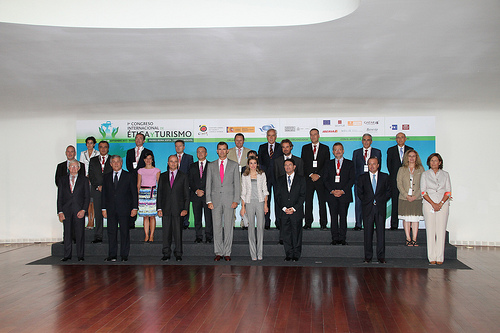Leading Businesses Commit to Global Code of Ethics for Tourism
Share on social media
Fourteen of Spain’s most prominent tourism businesses have signed their commitment to the Global Code of Ethics for Tourism at the first International Congress on Ethics and Tourism, which was officially closed by Their Royal Highnesses Prince Felipe and Princess Letizia of Asturias (Madrid, Spain, 15-16, September).
 Fourteen of Spain’s most prominent tourism businesses have signed their commitment to the Global Code of Ethics for Tourism at the first International Congress on Ethics and Tourism, which was officially closed by Their Royal Highnesses Prince Felipe and Princess Letizia of Asturias (Madrid, Spain, 15-16, September).
Fourteen of Spain’s most prominent tourism businesses have signed their commitment to the Global Code of Ethics for Tourism at the first International Congress on Ethics and Tourism, which was officially closed by Their Royal Highnesses Prince Felipe and Princess Letizia of Asturias (Madrid, Spain, 15-16, September).
“Today’s show of private sector commitment to the Global Code of Ethics for Tourism from some of Spain’s most important tourism companies is an important step towards a more ethical tourism sector and one other businesses will surely follow,” said His Royal Highness Prince Felipe of Asturias closing the Congress.
In signing their commitment, the companies pledge to uphold, promote and implement the values of responsible and sustainable tourism development championed by the Code of Ethics. The Code, adopted in 1999 by the UNWTO General Assembly and endorsed by the United Nations General Assembly in 2001, is a set of principles designed to guide the development of tourism in a way that maximizes the socio-economic benefits of the sector, while minimizing any negative impacts.
“If responsible tourism is to become a tangible reality in our world, it is essential that the private sector, like their counterparts in public institutions, embrace the principles of ethical, sustainable, and universally accessible tourism,” said UNWTO Secretary-General Taleb Rifai.
“Today, these companies have underscored their dedication to corporate social responsibility, to support the protection and empowerment of vulnerable groups, consumers and humanity’s heritage, to champion gender equality, poverty reduction, accessibility, cultural and environmental sustainability, and to facilitate access to decent employment across the globe,” he added.
The majority of the companies also signed the Code of Conduct for the Protection of Children from Sexual Exploitation in Travel and Tourism, committing themselves to concrete measures to protect children. The Code was founded by ECPAT International, a global network for the elimination of child prostitution, child pornography and the trafficking of children for sexual purposes, and is funded by the United Nations Children Fund (UNICEF) and supported by UNWTO.
The first International Congress on Ethics and Tourism brought together experts and high-profile public and private tourism stakeholders in panels on: the role of ethical frameworks in responsible tourism development; the promotion of equality and the fight against exploitation; poverty reduction; sustainable development; and corporate social responsibility.
The signatories
 Companies to sign one or both of the ethical codes: Association of Hotel Chains of the Balearic Islands (Agrupación de Cadenas Hoteleras de Baleares); Amadeus ITGroup; ASHOTEL: Spanish Federation of Tour Agents’ Associations (Federación Española de Asociaciones de Agencias de Viajes); Hotel Federation of Mallorca (Federación Empresarial Hotelera de Mallorca); Grupo Barceló; Grupo Iberostar; Grupo LOPESAN; Iberia; LORO PARQUE; Melia Hotels International; National ATESA; NH Hotels; ORIZONIA.
Companies to sign one or both of the ethical codes: Association of Hotel Chains of the Balearic Islands (Agrupación de Cadenas Hoteleras de Baleares); Amadeus ITGroup; ASHOTEL: Spanish Federation of Tour Agents’ Associations (Federación Española de Asociaciones de Agencias de Viajes); Hotel Federation of Mallorca (Federación Empresarial Hotelera de Mallorca); Grupo Barceló; Grupo Iberostar; Grupo LOPESAN; Iberia; LORO PARQUE; Melia Hotels International; National ATESA; NH Hotels; ORIZONIA.
The First International Congress on Ethics and Tourism was organized by UNWTO and the Spanish General Secretariat of Tourism and Domestic Trade, with the support and participation of: the European Commission, SEGITTUR (Spanish Cooperation for the Management of Innovation and Technology in Tourism), the Madrid Tourist Board, the Reina Sofia Museum, Iberia, Qatar Airways, Mélia Hotels International and the Banesto Foundation. EFE news agency and BBC World News were media partners.
Relevant links:
